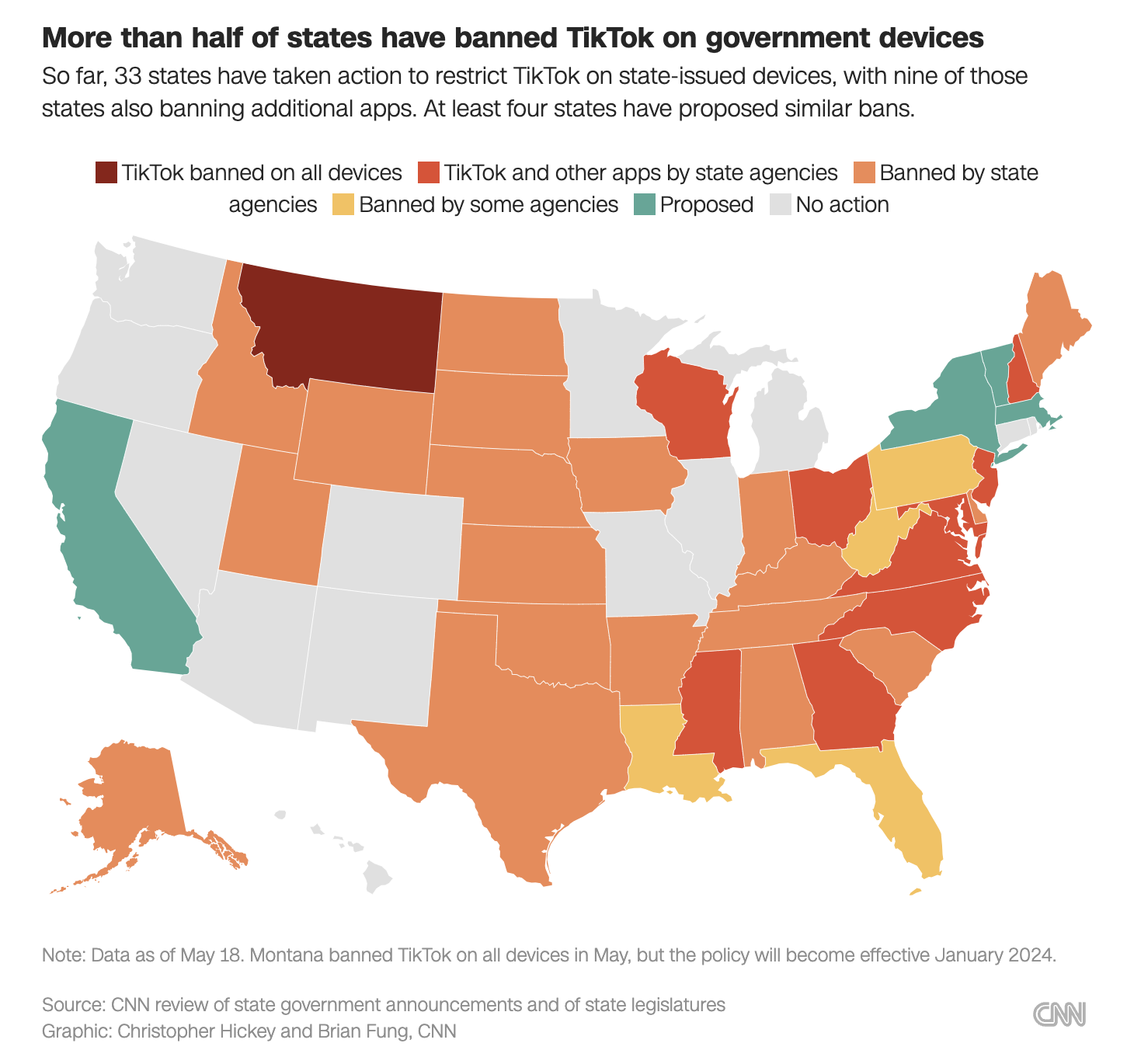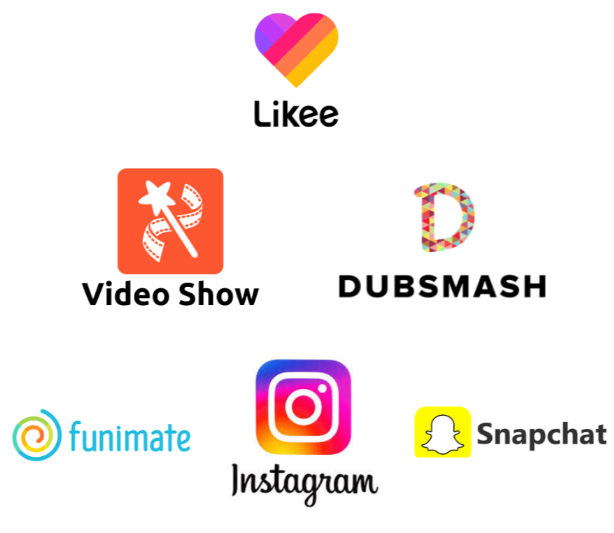Since 2018, TikTok has rapidly become a cornerstone of global social media culture, influencing other platforms and marketing strategies alike.
Recently, the U.S. Congress has taken steps that could lead to TikTok’s ban, including crucial votes in the House and discussions about Supreme Court involvement.
Here, we will explore the potential ramifications of a potential TikTok ban in the U.S. social media ecosystem, considering the impacts on users, legal frameworks, and the larger impact on marketing as a whole.
Implications of a Ban on TikTok in the U.S.
A ban on TikTok carries a lot of ramifications, both for users and social network developers alike.
The first noticeable effect would likely be a significant shift in where and how users engage with social media. Many of TikTok’s audience might migrate to platforms like Instagram or YouTube, seeking similar content and community vibes.
Content creators, pivotal to TikTok’s success, would need to rethink their strategies. They might adapt by diversifying their presence across multiple platforms or altering their content to fit different social media algorithms and cultures.
Already, some states in the U.S. have begun regulating or banning the TikTok app entirely, which is indicative of the progress already made toward a nationwide ban:

Let’s take a closer look into how this migration and adaptation could spur innovation in content delivery:
Other platforms might mimic TikTok’s model to retain the migrating user base
With the potential ban on TikTok looming, social media platforms like Instagram and YouTube might accelerate their adoption of TikTok-like features and technology, such as short-form video capabilities and enhanced algorithmic content recommendations. This could be seen as a strategic move to attract TikTok users who are looking for similar content experiences.
Such changes would not only cater to the existing user base but also entice new users, thereby maintaining their competitive edge in the social media ecosystem.
Emerging platforms will have to innovate to capture a significant portion of TikTok’s audience
TikTok makes up 45% of social media usage in the U.S., making it the fourth most popular social media platform currently. For the app to disappear entirely would leave a huge vacuum of space that other social platforms will inevitably try to gobble up:

Startups and lesser-known social media platforms might leverage this opportunity to introduce unique features that cater to the preferences of TikTok’s young audience.
These innovations could include advanced video editing tools, interactive live streaming capabilities, and robust community engagement features. By addressing the gaps left by TikTok, these platforms could attract users seeking new experiences, thereby reshaping the social media ecosystem.
Platforms will enhance creator support systems and monetization options to attract top talent from TikTok
As TikTok faces a possible ban, platforms like Facebook and Snapchat may enhance their support systems for content creators by offering improved monetization options and better revenue-sharing models.
This could include higher payouts for ad revenue, exclusive partnerships, and direct funding initiatives. These measures would be designed to attract top TikTok influencers and creators, ensuring that these platforms remain vibrant and appealing to both users and advertisers.
Key Takeaway: A ban on TikTok could transform user dynamics and content creation across all U.S. social media platforms, driving innovation and competition.
Legal and Regulatory Precedents
It’s no surprise that the U.S. government is moving to ban TikTok in the U.S., given the rising concerns about a national security risk brought upon by the platform. To add more fuel to the fire, President Biden signed a TikTok bill that gives ByteDance (TikTok’s parent company) nine months to sell TikTok or else it will face a full ban immediately.
The hope and intent here by Congress is that ByteDance will sell the social media platform to an American company that will harbor user data more safely, while also giving ByteDance the opportunity to cash in on the equity they’ve built in TikTok up until this point:

If a ban on TikTok is passed in the U.S., it will set a pretty poor precedent for all the other social platforms in the U.S.
Why is that, you ask?
Well, it will most likely mean that the app will be delisted from Google and Apple’s app stores, effectively killing it off just like that.
That sets an intimidating notion for other social media platforms because it will be demonstrated that even a large and widely popular social app isn’t impervious to a nationwide ban if American lawmakers are bent on making it go away. The way they’re deciding which apps ought to disappear is mostly rooted in the way the apps may compromise data in the U.S.
Let’s examine the broader implications of these legal and regulatory changes:
- Policy changes: App stores might tighten their policies, requiring more stringent security measures for app approval. This could lead to longer review times and increased costs for app developers as they implement these security features. Developers might need to continuously update their security protocols to maintain compliance, adding ongoing operational challenges.
- A tougher barrier to entry for foreign apps: Other foreign apps could face increased scrutiny or similar bans, altering the international app ecosystem. Heightened vetting processes could discourage foreign developers from entering the U.S. market, stifling innovation and competition. This could result in a more homogenized app market, dominated by domestic developers who can more easily meet the stringent requirements.
- Ripple effect on other nations: The U.S. stance could inspire other nations to adopt similar regulatory measures, impacting global tech operations. Countries might implement reciprocal bans or regulations, complicating international digital trade and cooperation. This could lead to a fragmented global tech space, where apps must navigate a patchwork of national regulations, affecting their global reach and user base.
Key Takeaway: A ban on TikTok in the U.S. could redefine digital policy and international tech relations, setting new standards for app security and foreign involvement.
Economic and Business Consequences
The financial impact on TikTok’s parent company, ByteDance, could be huge if they lose the U.S. market. This could mean a big drop in revenue.
Advertisers will also see changes in how they plan and spend money, affecting both the platforms and the advertisers themselves.
Here are some possible changes in the market:
- Other platforms with try to capitalize on the ad space: Platforms like Snapchat and YouTube might create new advertising options to attract businesses that used to advertise on TikTok.
- New acquisitions will likely follow: Big social media companies could look into new partnerships and buy other companies to strengthen their positions without TikTok in the market. Major platforms like Facebook and Google might pursue acquisitions and partnerships to fill the gap left by TikTok. This could involve buying emerging social media apps or teaming up with content creation tools to enhance their offerings.
- New companies will likely emerge: The ban could pave the way for new startups to enter the social media space. Remember, the primary cause for TikTok being banned is on the issue of national security, not because there’s anything inherently wrong with the app itself. It’s more about how the data extracted from the app might be used. If that part is cut out of the equation, there’s no reason why a safer lookalike app can’t come into the picture to replace it:

Key Takeaway: The ban on TikTok could cause major changes in how social media companies and advertisers operate, potentially transforming the industry.
Last Thoughts on the TikTok Ban’s Ripple Effects
A potential ban in the U.S. could alter the social media arena significantly, impacting users, legal standards, and business models.
As we consider these changes, it’s clear that the future of social media will not just adapt but may evolve in entirely new directions, shaped by both innovation and regulation.
The biggest takeaway right now is that nothing is set in stone yet.
Advertisers shouldn’t jump ship from TikTok just yet, as the ban is not complete, and there are still several stages it has to go through before anything is permanent. Until then, there’s still a lot of merit in involving TikTok in your social media marketing strategy.
Related Video
If you’re ready to level up your TikTok marketing, Single Grain’s TikTok marketing experts can help!👇
For more insights and lessons about marketing, check out our Marketing School podcast on YouTube.



